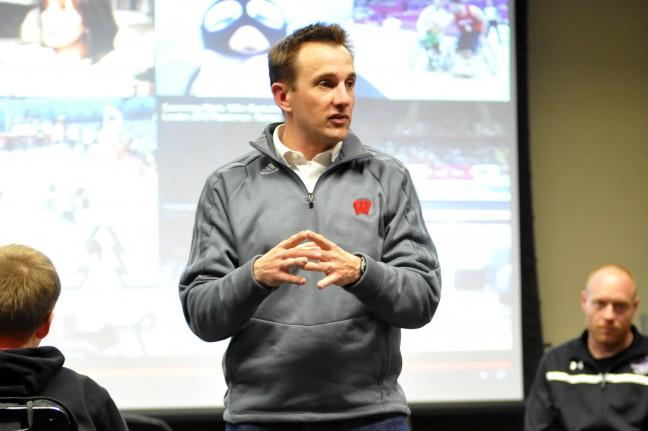Paralympic wheelchair basketball star Jeremy “Opie” Lade visited the University of Wisconsin-Madison Wednesday with his old coach and friend Tracy Chynoweth to speak about being a paraplegic athlete.
The talk was hosted by Advocates for Diverse Abilities, a UW-Madison student organization that advances disability awareness, supports those with disabilities inside and outside UW and advocates for people with disability.
Lade has been involved with Team USA wheelchair basketball since 2001. He became disabled when he was 8 years old after a car accident.
“It didn’t change my love for sports or need for competition, though,” Lade said.
In the 2008 Paralympic Games in Beijing, the American wheelchair basketball team was eliminated from gold medal contention by Canada and subsequently lost to Great Britain in the bronze medal game.
Lade said Team USA left the game without any trophy for participation after their defeat.
“That’s all we got — a long flight home,” he said.
Lade returned to the American men’s wheelchair basketball team in 2012 to compete at the Paralympic Games in London, where the team earned a bronze medal.
Currently, Lade is the head coach of the UW-Whitewater men’s wheelchair basketball team, and Chynoweth is his associate coach.
Chynoweth said the first time he encountered wheelchair basketball, he held some common misconceptions many people have about this sport.
“The coach was in the middle of the court shouting a bunch of four-letter words, and my first thought was, ‘Don’t yell at them, they’re in wheelchairs!’” he said.
Chynoweth said he did not make strides in coaching wheelchair athletics until he saw “the athlete in the wheelchair.”
The sport is played with many of the same rules as able-bodied basketball, and the equipment features allow the athletes to achieve a range of motion like any other player, he said.
“After you stay for an entire game of wheelchair basketball, you start seeing the game and not the equipment,” Chynoweth said.
Lade and Chynoweth will continue to coach wheelchair basketball at UW-Whitewater, where the program has enjoyed success in recent years.
UW-Whitewater’s niche in wheelchair basketball is special on a global scale, Chynoweth said. Many top high school wheelchair basketball players look at UW-Whitewater when choosing a college, he said.
“Whitewater in wheelchair basketball is like Duke in able-body ball,” Chynoweth said. “We recruit players just like Bo Ryan recruits players.”
Lade and Chynoweth said when they come talk to groups, their take-away message is to emphasize these players should be judged by their talent, not their disability.
Lade said part of his message is also to let people know that other than playing wheelchair sports, they lead everyday lives.
“One of the big messages is that just because we have some sort of disability doesn’t mean we’re different people,” he said. “The reason we come out and talk to people is to show them we’ve overcome the adversity we’ve faced in our lives.”


